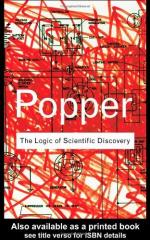
|
| Name: _________________________ | Period: ___________________ |
This test consists of 5 multiple choice questions, 5 short answer questions, and 10 short essay questions.
Multiple Choice Questions
1. What hypothetical estimate of frequency suggests equal distribution, normally based on considerations of symmetry?
(a) Random events hypothesis.
(b) Objective probability hypothesis.
(c) Extrapolation of statistical findings.
(d) Equal choice hypothesis.
2. What is used to make laws based on observations?
(a) Simplicity.
(b) Conventionalism.
(c) Theory.
(d) Probability.
3. What theory is based on random events?
(a) Subjective theory.
(b) Random Theory.
(c) Theory of chance.
(d) Normative theory.
4. What lies in the testability of simple systems?
(a) The flaw of simplicity.
(b) The construct of simplicity.
(c) The justification of simplicity.
(d) The value of simplicity.
5. If two statements have equal logical content what must also be equal?
(a) Their justification.
(b) Empirical content.
(c) Their inductive reasoning.
(d) Their logical probability.
Short Answer Questions
1. What has a limited utility in comparing falsifiers?
2. What increases with the increase of the degrees of falsifiability?
3. What does Popper consider dangerous for scientific research?
4. What does Popper state cannot be applied to a sequence of events?
5. What does not requires one to change the number of parameters of the displacements of groups of points.
Short Essay Questions
1. How is differentiation possible between theories whose differences are small and difficult to calculate?
2. What does Popper believe regarding the logical proximity of a theory to empirical statements?
3. Why, according to Heisenberg, can measurement not be a basis for prediction?
4. What is the basic contribution that Popper makes to the logic of the theory of probability?
5. How does falsifiability relate to the dimensions of a statement under investigation?
6. According to Popper, where does the value of simplicity lay?
7. How does Popper feel traditional inductivists work?
8. What is the concern with using infinite sequences?
9. What rule does Popper use when discussing the importance of probability in terms of physics?
10. How is the physical basis for the uncertainty theory undermined?
|
This section contains 759 words (approx. 3 pages at 300 words per page) |

|




